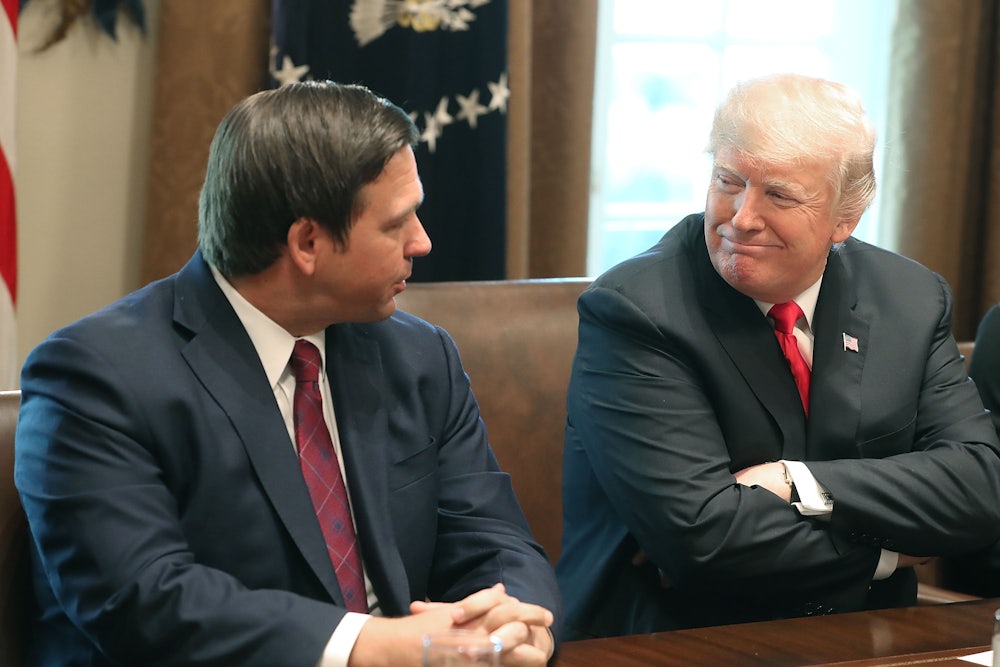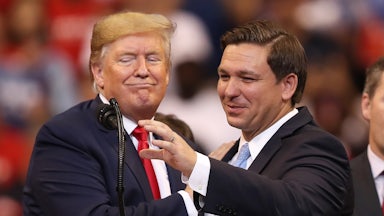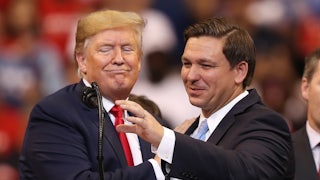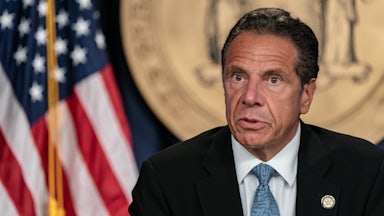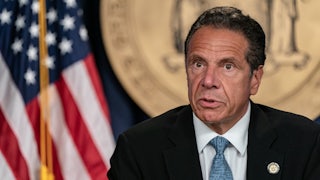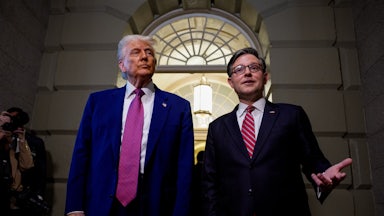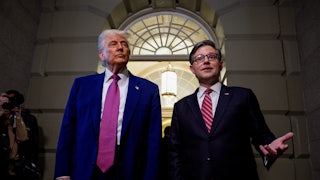Donald Trump wants Ron DeSantis to kiss the ring. The former president, in exile at Mar-a-Lago, has been “grumbling quietly to friends and visitors” that the Florida governor has thus far refused to state publicly that he will not run for the Republican presidential nomination in 2024 should Trump enter the race—itself all but a foregone conclusion at this point—per The New York Times. This feud has, in recent days, reached a boiling point, dividing Republicans and providing the first tantalizing bit of evidence that Trump’s hold over the GOP might not be quite as strong as it appears.
The horse race implications of the feud have led much of the coverage, for unsurprising reasons. That Trump would be the Republican nominee in 2024 has long been a matter approaching gospel; now DeSantis has emerged as the first viable challenger. Trump’s response—to pick a public fight with him—suggests he’s taking that challenge very seriously. This has led to some histrionics—coverage of Fox host Laura Ingraham saying she has not committed to supporting the former president has been breathless, even though it is hardly surprising given that we’re 10 months away from the midterm elections. Desperate for a contest—any contest—most media outlets find DeSantis’s growing profile delectable, particularly given that he is, in many respects, a creature of Trump’s own making. The fact that he could end up snatching the crown from his mentor turns a fairly banal story into one with faintly mythic overtones.
And yet the nature of the feud itself says a great deal about how much the politics of Covid-19 have shifted in the year since Trump left office. Trump has, over the past year, been—at least by the dismal standards of the right—a hype man for vaccines. DeSantis, meanwhile, has recently embraced vaccine skepticism and refused to disclose his own status. The result is, as the Times acknowledges in its piece, a rare instance in which Trump is “out-of-step with the hardline elements of his party’s base.” It also points to the growing potency of vaccine hesitancy on the right, as well as a potential fault line in upcoming elections in 2022 and 2024.
As president, Trump repeatedly downplayed the virus, attacked public health officials, and insisted that mitigation efforts were a vast conspiracy to damage him politically. The logic, to the extent it existed at all, was that Democrats and the media were purposefully colluding to damage his greatest accomplishment—the economic and (in particular) stock market gains of the late 2010s—by overhyping a virus that was little more than a flu.
Since losing the 2020 election, however, Trump has persistently claimed credit for the vaccines that emerged late in his term, as well as for the subsequent booster shots. His insatiable need to inflate his own accomplishments has led him to claim that, among other things, he saved tens of millions of lives by happening to be in office when researchers found effective vaccines. Although he was initially hesitant to disclose his own vaccination status, he has made several pro-vaccine comments over the past year—even as he has continued to cast doubt about the origins of the virus, many statements from public health officials, and the efficacy of mitigation efforts.
Speaking to One America News last week, Trump fired a shot at DeSantis. “They don’t want to say [if they’ve received a booster shot] because they’re gutless,” Trump said, obliquely referring to the Florida governor’s reluctance to say whether he had received a booster shot. “You gotta say it, whether you had it or not. Say it. But the fact is that I think the vaccines saved tens of millions throughout the world. I’ve had absolutely no side effects.” The idea here is to paint DeSantis as a typical politician, someone acting squirrely in a desperate attempt to cozy up to voters. Trump, in this version, is the straight shooter. DeSantis, meanwhile, is just another hack—exactly the type of spineless Republican that Trump easily cut through as he marched to the party’s nomination in 2016. But Trump’s own base may not have his back.
This isn’t 2016, and on vaccines, Trump is being outflanked on the right by many within his party. He, too, is trying to square a circle: appealing to his party’s rabid base by questioning “lockdowns” and other anti-Covid measures, while simultaneously insisting that he deserves credit for the vaccines themselves. As more boosters are required—something that seems increasingly likely as months go by—these shots will likely become even more of a political third rail on the right. Trump was, of course, booed by supporters for saying he was boosted at a rally late last year. DeSantis’s booster skepticism—which, by the way, is squirrely—is more in line with where Republican voters are right now than Trump’s own triumphalism.
That, of course, is disastrous from a public health and economic perspective and suggests that new variants of Covid-19, which have had a much more destructive impact on America than other more vaccinated countries, will continue to rage like a wildfire. But it also points to a growing, distressing political reality. Republican Party orthodoxy is now anti-vaccine, and particularly anti-booster. Ron DeSantis understands this. Donald Trump doesn’t.
